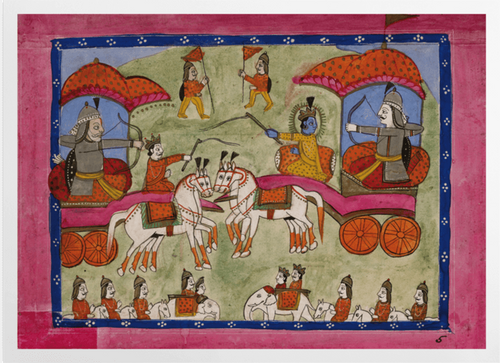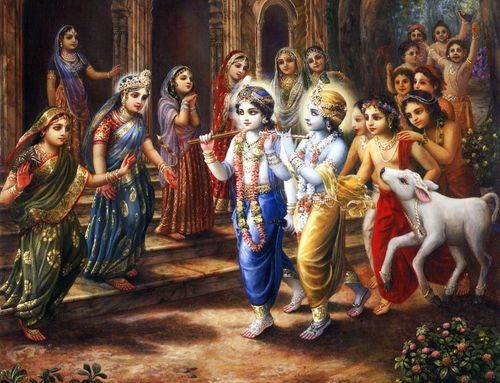Go Back

Bhagavad-Gita - Chapter 4, Verse 2
How relevant can the Bhagavad-Gita be in our modern daily life? As tradition tells us, it has been spoken more than 5000 years ago by Lord Sri Krishna, at a place called Kurukshetra. Is it simply a discourse between two personalities who have since long left this world, or can it help us navigate the maze of our destiny?
In this verse, Arjuna informs Sri Krishna of his reluctance to fight against Bhisma, his grandfather, and Drona, his preceptor, two people he holds in high regard, and who are worthy of his praise and worship. Arjuna is facing a quandry: he either has to engage in battle against his own family, his own kinsmen, or face dishonor by fleeing the war, in order to save the lives of those he loves.
Arjuna's Arguments
From verse 4 to verse 9, Arjuna is exposing his thoughts to Sri Krishna. Over and above his obvious personal interest in avoiding a fratricidal conflict, he lays down several reasons that add weight to his viewpoint. He states that killing superiors is a sin, an act contrary to all the instructions of sastra, that would forever prevent him to enjoy his existence if he ever indulged in it. As he says, all worldly gains resulting from the sons of Dhrtarastra’s murder would be “tainted with blood”.
Arjuna insists on the fact that his arguments are not merely sentimental; they are based on sastra, or vedic scriptures. He refutes Sri Krishna’s claims that he has been affected by a “degrading impotence”, and explains to Him that he wants to properly follow his dharma.
As Srila Prabhupada points out in his purport, in vedic society, superiors are to be respected always, and should not be presented even with a verbal offense. Arjuna calls Sri Krishna Madhusudhana, which is significant. Madhusudhana, in sanskrit, means “Madhu’s killer”. Madhu was a demon, who stole away the holy scriptures from Lord Brahma, and whom Sri Vishnu slayed. By reminding Sri Krishna of this incident, Arjuna wants to show Him that even though He does indeed take away asura ’s lives, he is never inimical to saints, or sadhus.
However, dharma also enjoins ksatriyas to engage in justified warfare, and strictly forbids them to surrender to their enemies. Srila Prabhupada says:
"For a kṣatriya, or administrator, there are so many abominable things; a kṣatriya has to be violent to kill his enemies, and sometimes a kṣatriya has to tell lies for the sake of diplomacy. Such violence and duplicity accompany political affairs, but a kṣatriya is not supposed to give up his occupational duty and try to perform the duties of a brāhmaṇa." [Bhagavad-Gita As It Is, Purport to 18.74]
It is interesting to note, therefore, that at the end of his discourse, Arjuna remains as troubled as he was previously. He addresses Sri Krishna as follows:
"Now I am confused about my duty and have lost all composure because of miserly weakness. In this condition I am asking You to tell me for certain what is best for me. Now I am Your disciple, and a soul surrendered unto You. Please instruct me."[Bhagavad-Gita As It Is, Purport to 02.07]
Dharma & Bhakti
As we can see, Arjuna’s reasoning is based on the dharma-sastras. Scriptures are divided in sections, according to the their subject matters. Dharma-sastras are a corpus of text describing proper social behavior, individual conduct, and the benefits achieved by abiding to those rules. The most notable dharma-sastra is the Manu-samhita, written by Manu himself, the father of humanity, and is effectively a lawbook for human society. There is, however, knowledge that stands above what is described in this portion of the Vedas. Srila Prabhupada tells us:
There are twenty kinds of śāstras, dharma-śāstra. Vimsati dharma-śāstra. So what is the necessity of these dharma-śāstras? Actually, there is no need of dharma-śāstra. Kṛṣṇa also says the same thing. Sarva-dharmān parityajya. [Lecture - Gorakhpur, February 17, 1971]
It is described that by following dharma, moksa, or liberation, is gained. Why is it then said that dharma isn’t necessary? Krishna says:
Abandon all varieties of religion and just surrender unto Me. I shall deliver you from all sinful reaction. Do not fear. [Bhagavad-Gita As It Is, 18.66]
By surrendering to Sri Krishna, not only do we attain moksa, but we also get to taste the mellows of bhakti, or devotional service, to the Supreme Personality of Godhead. In the words of Bilvamangala Thākura:
“Mukti herself is standing with folded hands, waiting to serve the devotee.” [Krishna-karnāmrita 107]
Bhakti is superior to dharma, artha, kama and moksa. It is the purest expression of the atma. Sri Krishna exposes to Arjuna the immortality of the soul, its incarnations in various bodies, its assent to the spiritual world, and its eternal position as a servant of the Absolute Truth, which constitutes the tenets of the bhakti-sastras.
By imparting this confidential knowledge upon Arjuna, Sri Krishna effectively allows him to reconsider both his position and the one of his parents and friends. He enables him to see his position under a different light, the light of transcendental understanding. After having instructed him, Sri Krishna lets Arjuna free to act as he pleases:
Thus I have explained to you knowledge still more confidential. Deliberate on this fully, and then do what you wish to do. [Bhagavad-Gita As It Is, 18.63]
Why then could this verse be relevant for us in this day and age? During the course of our lives, there might be times where we have to make difficult decisions. This text comes at the beginning of the second chapter, just after the scene has been set, and Arjuna’s dilemma presented. It is easy to identify with Arjuna, bewildered as he is by the cruelty of the circumstances he finds himself into.
By describing Arjuna’s difficulties, the Bhagavad-Gita then shows the value of the knowledge it’s propounding. Once Arjuna understands Sri Krishna’s teachings, his grief is driven away, and he is ready to act in a way that befits his status as a ksatriya.
About the Author

Vidura Dasa
Vidura Dasa is a full-time temple resident. He is engaged in various services, such as performing puja, managing New Mayapur's social media, and IT support. He has a Bachelor of Fine Arts, and is passionate about music and everything computer-related.
Read More

Who is Sri Balarama ?
#TempleLord Balaram. What to say about such a wonderful and attractive personality? His dazzling complexion more white and cooling than crystal, autumn clouds, cascades, full moons and white lotuses; his spa...

Discovering the New Mayapur Farm
#FarmNew Mayapur isn't only a temple. It is home to an ever-growing community of dedicated devotees, who are always engaged in various services to Sri-Sri Gaura-Nitai, Sri-Sri Radha Govinda-Madhava and Sri...